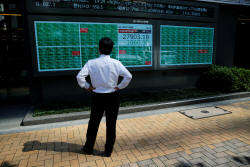Share markets gripped by caution as U.S. inflation data
awaited
 Send a link to a friend
Send a link to a friend
 [September 14, 2021] By
Tom Arnold and Scott Murdoch [September 14, 2021] By
Tom Arnold and Scott Murdoch
LONDON/HONG KONG (Reuters) - World share
markets barely moved and the dollar held steady on Tuesday, as investors
awaited U.S inflation data for more clues on the health of the world's
largest economy and when the Federal Reserve could start to taper
stimulus.
Fears that inflation may prove more prolonged than central bankers
expect have kept stocks down so far in September after seven-months of
gains, spurred by the global economy's recovery from the COVID-19
pandemic.
European shares were 0.1% lower, with luxury shares tracking their Asian
peers down on concerns about the spread of COVID-19 cases in China.
MSCI's world stocks benchmark was flat.

In the U.S., futures signalled a slightly positive opening.
"Right now, investors are more cautious then they have been. September
tends to be a weaker month historically for equity prices," Credit
Suisse's senior investment strategist Suresh Tantia said.
"Equity prices have been very high, so clients are more cautious now.
There is the prospect of Fed tapering in the next 2 to 3 months and that
is a negative catalyst for markets."
In Asia, China's tightening grip on its technology companies and a
widening liquidity crisis for the country's most indebted developer
again kept investors on edge.
MSCI's broadest index of Asia-Pacific shares outside Japan was down
0.4%.
Hong Kong's Hang Seng Index sank 1.2%, with shares of developer China
Evergrande Group slumping to the lowest point since 2014 after it said
it had appointed financial advisers to examine its capital structure.
The company also said sales would fall again in August due to concerns
over its debt which would hurt its liquidity and cash flow.. Evergrande
shares were down 11.9% .
China's blue-chip CSI300 index lost 1.5%.
China's technology stocks are also being closely scrutinised after
authorities told the country's tech giants to stop blocking each other's
links on their sites.
The directive was the latest in a string of tightening regulations that
has dragged down the Hang Seng Tech Index by nearly 40% since its peak
this year in February.

The Nasdaq Golden Dragon China Index, which tracks Chinese companies
listed in the United States, fell 1.1% on Monday, to take its decline
over the past six months to 35.5%.
"We are still concerned about the regulations, what they mean and how
they will be rolled out, but with the correction that is underway, that
means there is some value in certain parts of the Chinese equities
market," Luke Moore, Oreana Financial Services chief executive, told
Reuters.
"We don't see an end in sight to the changes yet, we think the
uncertainty is going to continue and everyone is looking for clarity on
how far the regulations will go and what could be next."
A fresh spike in COVID-19 cases in China's southeastern province of
Fujian also kept investors cautious.
[to top of second column] |

A man watches an electric board showing Nikkei index outside a
brokerage at a business district in Tokyo, Japan, June 21, 2021.
REUTERS/Kim Kyung-Hoon

The National Health Commission said 59 new locally transmitted cases were
reported for Sept. 13, up from 22 infections a day earlier. All of them were in
Fujian, bordered by Zhejiang to the north and Guangdong to the south.
Meanwhile, markets are awaiting U.S. inflation data on Tuesday, expected to show
core consumer prices rose 0.3% in August. Prices were up 0.3% the previous month
and 0.9% in June.
Economists expect annual inflation to ease slightly to 4.2% from 4.3% in July.
The data comes ahead of a key meeting by the Federal Reserve on Sept 21-22.
"We note that several banks are adjusting their forecast higher at the very last
minute, all referring to the upside risk for rents. In fact, house prices are
rising fast and, historically, rents have been correlated to house prices in the
longer term," said Markus Allenspach, Julius Baer's head of fixed income
research.
"We hear...that car producers are cutting their production but maintain their
profit targets. This implies higher selling prices – in sharp contrast to the
economists' expectation that prices of used and new cars will fall back soon."
Graphic: US inflation -
https://fingfx.thomsonreuters.com/
gfx/mkt/egpbkyynmvq/Pasted%20image%201631601618640.png
The prospect of a corporate tax hike in the United States from 21% to 26.5% as
part of a $3.5 trillion budget bill remains front and centre for investors.

Goldman Sachs estimates a tax rate increase to 25% plus half of the proposed
hike in foreign income tax rates could shave 5% off S&P500 earnings in 2022.
The dollar index was broadly flat at 92.5 after falling back from its two-week
high reached on Monday of 92.9.
The yield on benchmark 10-year Treasury notes was slightly higher at 1.3276%
compared with its U.S. close of 1.324% on Monday. The two-year yield, which
rises with traders' expectations of higher Fed fund rates, touched 0.2190%
compared with a U.S. close of 0.215%.
Bond yields in the euro area were unchanged, with Germany's 10-year yield, the
benchmark for the bloc, at -0.33% by 0722 GMT, near a eight-week high hit last
week at -0.31%. [L8N2QG19D]
Oil prices hit a six-week high on Tuesday on concerns that another storm could
affect output in Texas. U.S. crude ticked up 0.7% to $70.91 a barrel. Brent
crude rose 0.6% to $73.96 per barrel.
Gold was slightly lower. Spot gold traded at $1,792.8 per ounce. [GOL/]
(Reporting by Tom Arnold in London and Scott Murdoch in Hong Kong; editing by
Jacqueline Wong, Muralikumar Anantharaman, Philippa Fletcher and Raissa
Kasolowsky
[© 2021 Thomson Reuters. All rights
reserved.] Copyright 2021 Reuters. All rights reserved. This material may not be published,
broadcast, rewritten or redistributed.
Thompson Reuters is solely responsible for this content.
 |